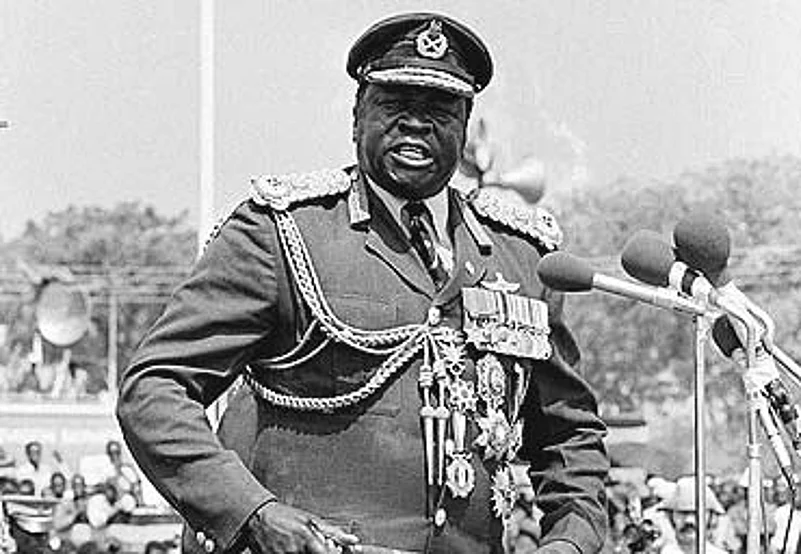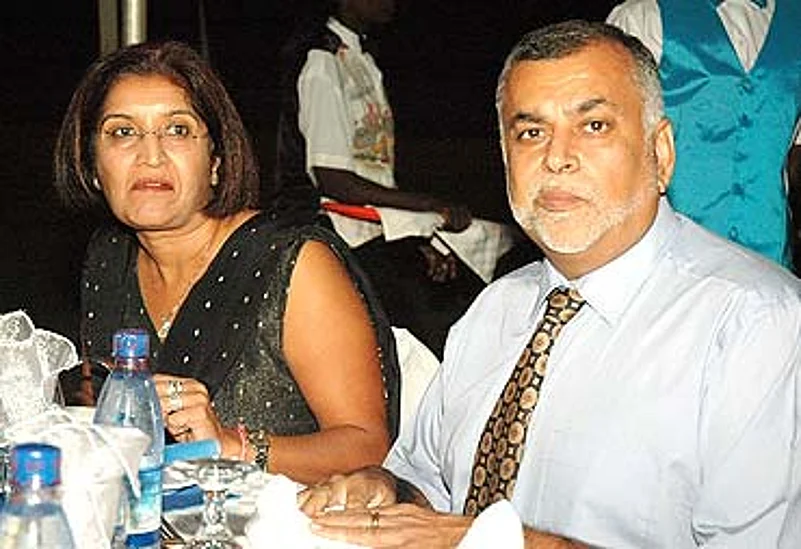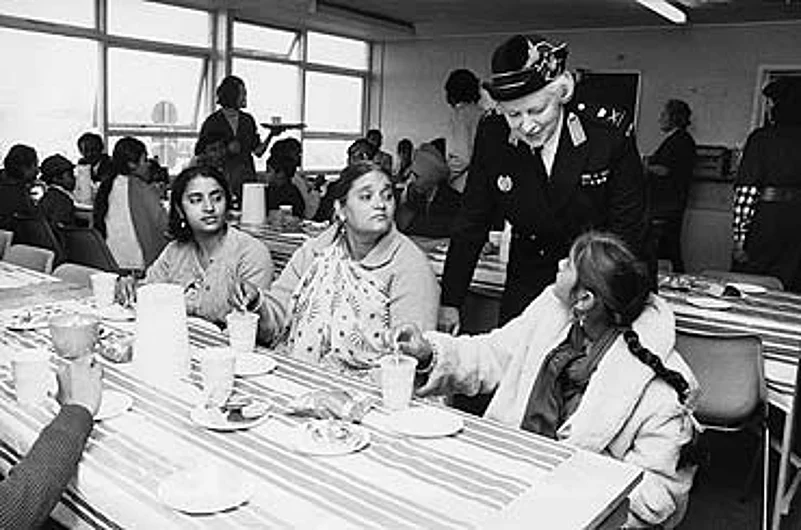- Dictator Idi Amin ordered Asians, mainly Indians, out of the country in 1972
- In the '80s, the Milton Obote government passed a legislation returning property to those who had left in 1972
- Among the Indian returnees were a large number of businessmen who harnessed the new political climate to their advantage
- Sudhir and Jyotsna Ruparelia started from a store selling beer in the '80s. Today their Meera Group owns banks, hotels, foreign exchange centres, insurance companies, etc.
- Jyotsna is described as the most successful Asian businesswoman in Africa; Sudhir is universally known as the "money magnate"
- Mayur Madhvani, filmstar Mumtaz's husband, has expanded his business across the world from Uganda
- Business houses from India are moving into Uganda, as also those willing to take up jobs and run businesses
***

Unlike many others, they didn't stay. Jyotsna told Outlook, "Sudhir never got used to the UK. He returned in 1985, and I joined him in 1986. We're much happier here than we were in London." With reason—life in London offered little beyond the basic middle-class comfort. Back in Uganda, the Ruparelias took a shop and began selling beer and soda. "It worked out perfect," says Jyotsna. Today their Meera group of companies owns banks, foreign exchange centres, hotels, resorts, insurance companies and more. Jyotsna is described as the most successful Asian woman in Africa; Sudhir is called Uganda's "money magnate".

Jyotsna and Sudhir Ruparelia
But the Ruparelias aren't the only Indian success story. Take the Madhvanis, the family long famous in East Africa, whose fame spread to India when Mayur Madhvani married film star Mumtaz, smashing a whole generation of male hearts. They were the original iconic Indian success in Uganda. So, when too many Indians refused to budge on Amin's orders, because they couldn't believe they were being ordered out, Amin locked up Manubhai Madhvani, Mayur's elder brother. "That strategy, bad as it was, worked," Mayur told Outlook.
In 1986, though, they too returned. "Our heart was in Uganda. From the business point of view, it made no sense to return to a country that had no infrastructure, and we would have to rehabilitate units that were totally damaged. But we took on the challenge." Now, the Madhvanis have more than doubled their annual sugar production at the Kakira sugar works from the levels of the early '70s to above 1,50,000 tonnes. They've expanded business to other parts of Africa, the Middle East, Europe and now India, in sectors ranging from sugar to glass manufacture to hotels.
These unsung returnees are ahead of all the new buzz about investing in Africa, a solid pocket of resistance to the Chinese surge. But Indians who succeed in Africa are still regarded as strange adventurers that we're embarrassed about, they can't spot a risk when it stares them in the face, hanging around in a land no one really wants to know about, and seen only at events like the Africa Summit that Delhi hosted in April. As seen from India, a dollar earned in Africa is somehow less than a dollar earned in America.
The Indian story in Uganda was resumed after a remarkable piece of legislation by the Milton Obote government in the early '80s, returning property to those who were ordered out. "What we got back was shells," says Atul Radia, who came back to launch an ICT (information and communication technologies) business. "But it was something to build on." Most people sold and stayed on in Britain. "They must be regretting it now, seeing how the Ugandan and East African economy is growing," says Jyotsna.
Some Indians returned also because the Idi Amin regime was not quite as evil with Indians as is widely believed. "There was this confused fellow, Idi Amin, who killed three Indians; Ugandans, he killed half a million," President Yoweri Musevini told Outlook. Amin asked Indians to leave because capital Kampala had started to resemble an Indian city, where natives worked mostly as servants and staff.

Deported Ugandan Indians in the UK in ’72
But the ghost of Amin turned out to be bigger than the man. "Before I came to Uganda, I had heard of only one thing about the country—Amin," says Jayesh Patel, manager of a new cotton business. "But it's nothing like that here; they're really nice people, we have a wonderful weather, and the business scene, it has its ups and downs, but it's overall fine." Adds Mohan Kaul, CEO, Commonwealth Business Council, "This Idi Amin thing is still alive in the minds in India. The Indians who were here in 1972 are returning in big numbers, they have no fears, their businesses are prospering."
Over the last couple of years, a rare venture into Uganda from India has been dairy pioneers Sameer Agriculture, launched jointly by Kenya's Sameer group and India's Ravikant Jaipuriya group. "We have rehabilitated our plant and the current turnover is $12 million which is likely to go up to $40 million soon as we're setting up one of the largest milk powder plants of Africa in Kampala, which will be Uganda's first powder plant," says MD A.G. Gaggar.
Musevini has been publicly celebrating the success of the milk company from India. And Uganda is ready for more from India—the Tatas and Mahindras are stepping in through South Africa, and discovering a climate favourable for business, not least because Uganda claims to have the biggest population of graduates in Africa. And quietly, thousands of Indians have come in for jobs and small businesses. "People come for jobs, start a shop or petrol station, then move into bigger business," says Ruparelia.
"If the West is the past and Asia the present, Africa is the future," says Rajesh Chaplot, who runs a successful printing and posters business. The truth might not be quite as neat as that, but Indian investors are looking more at high-cost economies, and missing new opportunities in Africa where others—China, Europe, and America—are rushing to.

























